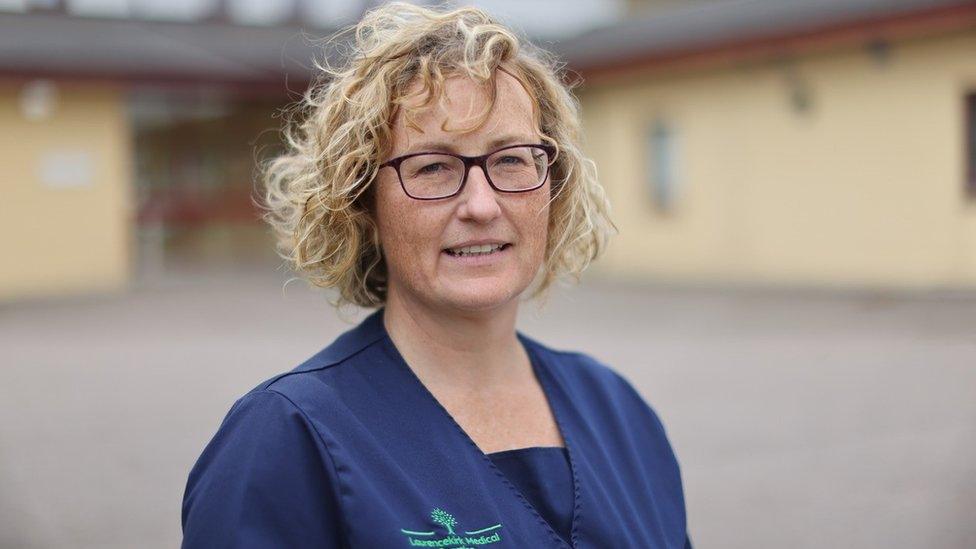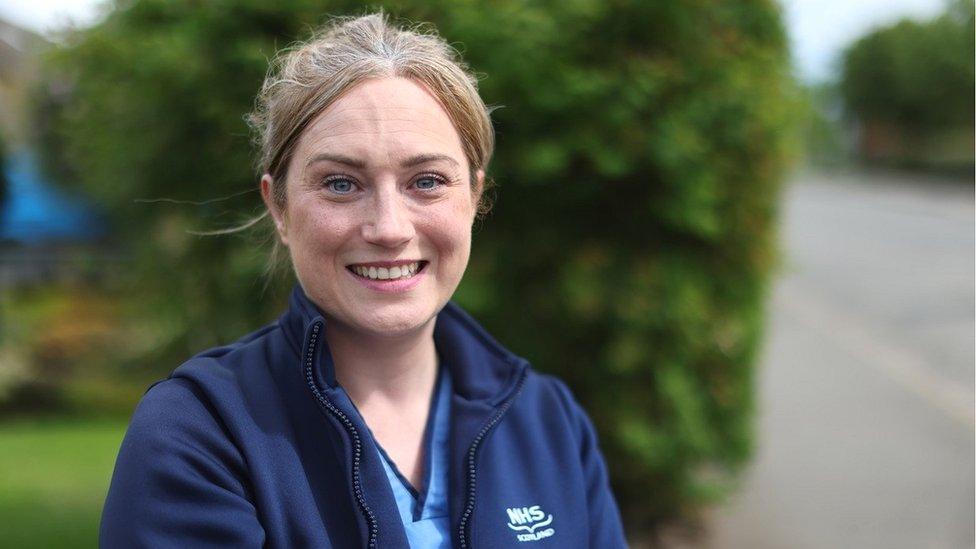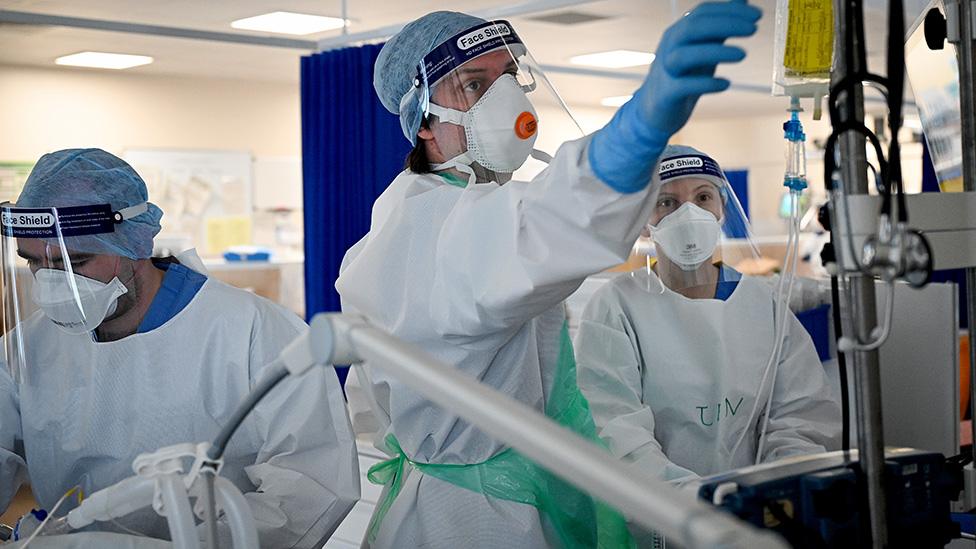Care shortages could overwhelm Scotland's NHS, doctors warn
- Published

Dr Emma Houghton, a GP at Laurencekirk Healthcare Centre in Aberdeenshire, is seeing patient demand soar
Social care shortages are leaving community health services overwhelmed, doctors have warned.
Increased demand and staff shortages mean at-home and care home services across Scotland are overstretched.
One GP working in a project to prevent vulnerable people from going to hospital unnecessarily said "things are becoming potentially unsafe".
The Scottish government said it was making record levels of investment in social care.
A lack of available social care support in the community has been one of the drivers for an increase in so-called bed blocking, where patients are not able to be discharged from hospital despite being fit to leave.
BBC Scotland spent time with an initiative in the town of Laurencekirk, Aberdeenshire, which aims to reduce bed blocking.
Known as a "virtual community ward", every day at Laurencekirk health centre a meeting takes place to discuss vulnerable patients who may need additional help and are at risk of being admitted to hospital.
The group - which includes GPs, nurses, physiotherapists and social workers - can each draw attention to patients they're concerned about and then assign the right people to follow up and take action.
Prior to the pandemic, the group was preventing 600 hospital admissions a year but it is getting harder according to Dr Emma Houghton, a GP at Laurencekirk Healthcare Centre.
She said: "I think the satisfaction of doing the best that you can for a patient - that's why we all came into this job.
"It's the frustrations when you can't because the system pressures is difficult.
"That's what we're struggling with at the moment as a profession, where things are becoming potentially unsafe, because we're overwhelmed."

'People come in to see me here'
Elsie Johnston, 95, says being able to stay in her own home is very important to her
Elsie Johnston has lived in the same house in Laurencekirk for more than 40 years but she couldn't stay there without the help of her carers.
The 95-year-old needs four visits a day given her complex needs, but is grateful for the fact it keeps her in her own home.
"Carers get me up in the morning and put me down to bed at night," she said.
"It's very important, people come in to see me here when they wouldn't come to a hospital."
The experts in the virtual community ward project also agree it is important to keep Elsie at home.
"She has the maximum amount of care that we can provide and so far it's working at keeping her at home," explained district nurse Jackie Kirk.
"A hospital setting is not the right setting for Elsie. Being at home with friends and family is hugely important."

District Nurse, Jackie Kirk, says hospital is not the right setting for Elsie
But it's more than that for Elsie according to healthcare assistant, Wendy Craig.
She said: "She gets frightened if she thinks she has got to be admitted to hospital.
"Elsie grew up in the area where I live, so she always asks me about it. She lived on a farm there. I'm a link with her past.
"She just likes to chat because then it's maybe a few hours before she sees anybody again."

Recent NHS figures show there's been an increase in the number of people facing a delay in being discharged from Scotland's hospitals.
In April there were 53,604 days spent in hospital by people whose discharge was delayed. This is an increase of 64% compared with the number of delayed days in April last year.
'Not seen it like this in my career'
Cameron Matthew, divisional general manager of surgical services for NHS Grampian, sees the impact of this every day at Aberdeen Royal Infirmary, which operates at about 95% capacity most days.
He said: "In any given day, there'll be 50 patients who are delayed transfers of care. So that's a ward and a bit, and that will have an impact on our ability to do planned care.
"I think the biggest challenge we have is access to care packages out in the community, access to care home beds and access to community hospital beds. That gap of unavailability of care packages for these patients slows down the whole of the system.
"I will say I've not seen it like this in my career. I've had about 30 years of working in the NHS and I've not seen us have as many patients backed up in ambulances and having to cancel operations to the same extent."
The Scottish government said it was already taking action to ease the pressures on social care services.
Kevin Stewart, the minister for social care, said the government was committed to establishing a National Care Service.
"We have committed to increasing social care funding by £800m by the end of the parliament," he added.
"We are investing in social care workers, increasing the minimum hourly rate of pay to £10.50 per hour. And we are working to establish clearer options for a career pathway for staff."


We are seeing a steady increase in the number of hospital beds taken up by patients who are medically ready to go home, but also a significant increase in the length of time they are staying.
This is an indication of how much pressure community health services are facing.
Sometimes it's because care packages are complex and there are shortages of district nurses, social work staff, occupational therapists and physios to put them in place.
In some places it is capacity in care homes or in rehabilitation facilities. But the biggest issue is a huge shortage of carers who ensure people have their basic needs met.
The Scottish government has plans to improve social care and will introduce legislation for a new National Care Service by this summer.
But this will take time to deliver. In the meantime demand is soaring with an acute shortage of people to deliver care now.

Related topics
- Published23 September 2021

- Published28 January 2022

- Published31 May 2022
